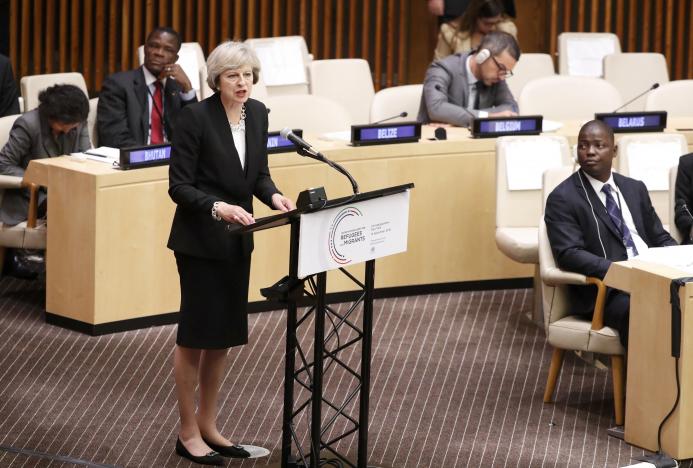On New York mission, Theresa May seeks to shore up UK influence after Brexit
On a mission to shore up British clout after the shock vote to leave the European Union raised questions over the future unity of the West, Prime Minister Theresa May will tell leaders on Tuesday that Britain will not turn away from the world.
In her maiden speech to the United Nations General Assembly, May will sketch her views on how to deal with terrorism, mass migration and modern slavery while also calling for modernisation of the 71-year-old organisation.
On Brexit, May will tell the General Assembly that the British people "did not vote to turn inwards or walk away from any of our partners in the world," according to remarks released by her office.
She told reporters in New York on Monday that she was "batting for Britain" after the Brexit vote.
The June 23 vote took many investors and chief executives by surprise, triggering the deepest political and financial turmoil in Britain since World War Two and the biggest ever one-day fall in sterling against the dollar.
Britain's allies fear that its exit from the EU could mark a turning point in post-Cold War international affairs that will weaken the West in relation to China and Russia, undermine efforts towards European integration and hurt global free trade.
Britain retains its role in the NATO military alliance as the EU's biggest defence spender, its permanent veto-wielding seat on the UN Security Council and four submarines armed with nuclear ballistic missiles.
But some diplomats and CEOs are worried that Brexit could torpedo Britain's economic interests and clout, a suggestion that riles British ministers.
"BATTING FOR BRITAIN"
US, Japanese and European banks have raised concern about the impact on London, currently the only global financial centre to rival New York, while investors say the shape and timing of Brexit remain unclear.
May has said she will not trigger the formal EU divorce this year and will get a good deal for Britain, though elections next year in France and Germany could complicate negotiations on an exit deal.
While recent economic data suggests the economic impact of Britain's vote to leave the EU has not been as severe as some predicted, the hit to the world's fifth-largest economy is also unclear and there are some signs of a slowdown in investment.
May, who says she will implement Brexit even though she argued against it before the vote, met Wall Street bankers and the heads of some of North America's biggest companies on Monday night in an attempt to reassure them on Brexit.
"What I think is absolutely crucial is that we recognise that coming out of the European Union gives us opportunities - opportunities to go out there around the world, be ambitious for the trade deals we want to do," May told reporters.
"That’s what this government is doing, going out there around the world, batting for Britain."
US President Barack Obama has called for an orderly Brexit while affirming strong ties with London. Republican presidential nominee Donald Trump has said that the Brexit vote was a "great thing" and that Britain would remain a great ally.
May, who argued before she won Britain's top job that the UN was flawed but necessary, said the 193-member organisation that Britain helped found should ensure its relevance by serving the millions of people who feel left behind by globalisation.
"We must recognise that for too many of those men and women the increasing pace of globalisation has left them feeling left behind," May, 59, will say. "This is not the time to turn away from our United Nations. It is the time to turn towards it."






